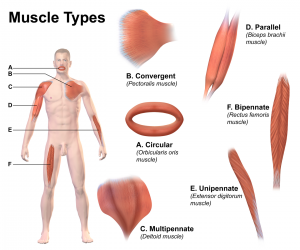The Muscular System
The allows the body to move voluntarily, but it also controls involuntary movements of other such as heartbeat in the circulatory system and peristaltic waves in the . It consists of over six hundred skeletal muscles, as well as the heart muscle, the smooth muscles that surround your entire alimentary canal, and all your arterial blood vessels (see Figure 2.24 “The Muscular System in the Human Body”). Muscle contraction relies on energy delivery to the muscle. Each movement uses up cellular energy, and without an adequate energy supply, muscle function suffers. Muscle, like the liver, can store the energy from in the large polymeric molecule . But unlike the liver, muscles use up all of their own stored energy and do not export it to other in the body. Muscle is not as susceptible to low levels of blood glucose as the brain because it will readily use alternate fuels such as fatty acids and protein to produce cellular energy.

“Muscle Types” by BruceBlaus / CC BY-SA 4.0
Learning Activities
Technology Note: The second edition of the Human Nutrition Open Educational Resource (OER) textbook features interactive learning activities. These activities are available in the web-based textbook and not available in the downloadable versions (EPUB, Digital PDF, Print_PDF, or Open Document).
Learning activities may be used across various mobile devices, however, for the best user experience it is strongly recommended that users complete these activities using a desktop or laptop computer.
The organ system consisting of skeletal, smooth and cardiac muscles that are responsible for movement, posture and the circulation of blood throughout the body.
A group of organs that work together to perform different functions.
The system of organs that are responsible for ingestion, digestion, and absorption of food and the discharge of residual wastes.
A 6-carbon monosaccharide that is the major carbohydrate used to provide energy in the body.
The storage form of a complex carbohydrate composed of multiple units of glucose linked together in a highly branched structure.
A group of tissues that performs a specialized function.
